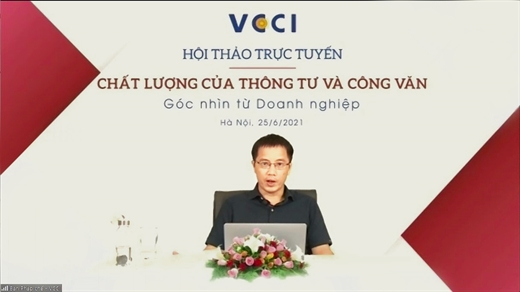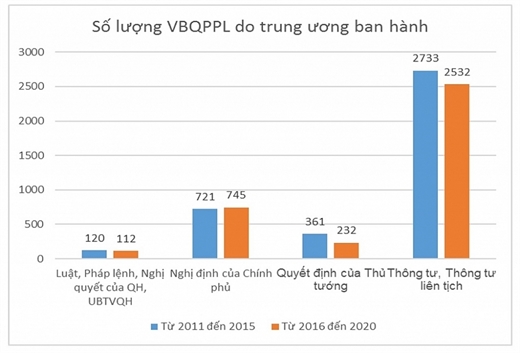Australia supports Economic Reform in Vietnam (Aus4Reform)
- en
- News and Media
- Aus4Reform News
- Enterprises face difficulties due to "distortion" of circulars
8/7/2021
Enterprises face difficulties due to "distortion" of circulars
According to statistics by VCCI, the number of circulars is much higher than other legal documents. However, many circulars have created a "distortion" with laws and decrees, causing difficulties for businesses.
Enterprises face difficulties due to "distortion" of circulars
According to statistics by VCCI, the number of circulars is much higher than other legal documents. However, many circulars have created a "distortion" with laws and decrees, causing difficulties for businesses.
On June 25, in Hanoi, with the support of the Australia supports economic reform in Vietnam (Aus4Reform) program, the Vietnam Chamber of Commerce and Industry (VCCI) held a seminar themed ‘Quality of Circulars and Official Letters – An Enterprise Perspective’.
 |
| Dau Anh Tuan, Head of the Legal Department (VCCI) |
At the seminar, Dau Anh Tuan, Head of the Legal Department (VCCI), said there was still a state of circulars promulgating business conditions.
For example, Circular 03/2018/TT-NHNN on licensing, organization and operation of microfinance institutions; or the circular stipulating administrative procedures but not assigned by a law or ordinance.
Tuan also named a number of circulars that are not suitable and inconsistent with the Decree, such as Circular 02/2021/TT-BGTVT of the Ministry of Transport stipulating that the installation of cameras must be able to monitor the passenger compartment, while Decree 10/2020/ND-CP of the Government does not require this.
 |
Additionally, there is a lack of clarity in the regulation of circulars, leading to inconsistent interpretations among agencies.
Nguyen Hoai Nam, Deputy General Secretary of the Vietnam Association of Seafood Exporters and Producers (VASEP), also pointed out some inadequacies of the circular, such as the difference between the circular and the decree or law.
For example, Circular 26/2016 and Circular 36/2018 of the Ministry of Agriculture and Rural Development regulate the quarantine of imported aquatic products. These two circulars regulate the inspection of food safety criteria for the group of aquatic products used as food. They do not follow the mechanism and method prescribed in Decree 15/2018/ND-CP guiding the Law on Food Safety.
There is even a situation of difference in circulars in ministries with the same control mechanism. For example, Circular 48/2013 of the Ministry of Agriculture and Rural Development and Circular 52/2015 of the Ministry of Health both regulate the control and inspection of food safety for exported food products, but the method of risk management and inspection is completely different.
Moreover, the representative of VASEP said many regulations in circulars and official letters lacked practicality and feasibility. The delay in the issuance of official letters still occurs.
Although an official letter is not a legal document, without it, the procedures will stop. In addition, many official letters are difficult to understand; and some of them include regulations and procedures which are unreasonable.
At the seminar, many businesses commented on the unreasonable but slow amendment of circulars and official letters. For example, regarding the regulation on safety and quality inspection of elevators and escalators before customs clearance of the Ministry of Labor, War Invalids and Social Affairs, businesses proposed from the beginning of 2018, but it was not until April 2021 that this agency issued a revised document, turning it into a post-approval examination to make it more reasonable.
Specifying the reasons, according to Nguyen Minh Thao, Head of Business Environment and Competitiveness Department of the Central Institute for Economic Management (CIEM), the first reason is management thinking. Currently State agencies still manage based on existing state tools, rather than focus on the development of enterprises.
The second reason is the formulation of a number of legal provisions based on a specific situation, not on the general situation. For example, the circular stipulating the installation of cameras to monitor passengers is based on the case of vehicles carrying in excess of the prescribed number only.
In particular, the representative of CIEM emphasized the lack of a monitoring mechanism in the process of issuing circulars and official letters. Moreover, when errors occur, it is necessary to attribute the responsibility to the heads of the promulgating documents, circulars, and official letter, who are ministers and heads of agencies and units.
On the business side, the representative of VASEP suggested that associations and businesses should participate in the process of developing legal letters and drafting agencies should have a progressive attitude in collecting comments and suggestions.
According to Dau Anh Tuan, Head of Legal Department of VCCI, management agencies need to professionalize the process of drafting circulars, controlling and combating conflicts of interest; need to enhance and promote the role of the "gatekeeper" of the circular; strengthen consultation, practical mechanisms for enterprises to participate, and have a more important voice in the circular drafting process. But above all, it is necessary to limit the issuance of circulars.

